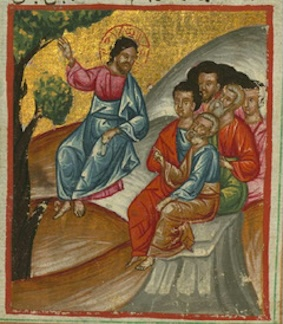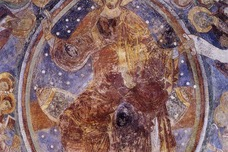Sunday Reflection with Canon Robin Gibbons: 25th July 2025

Jesus teaching his disciples. Wiki image
17th Sunday in Ordinary Time
Prayer is at the heart of our first reading from Genesis and the section of Luke's gospel of this Sunday.
In the story of Genesis 18:20-32, the apparent outcry of the victims over the sinful behaviour and the effect on others, of the actions of Sodom and Gomorrah, by violating the sacred law of hospitality, provides the central part of a dialogue between Abraham and the Lord. Note well, we are not told here what this sinful behaviour is in detail, only that the Lord wants to see what exactly is going on, if the outcry against those perpetrating evil matches their sinful behaviour.
In many ways this is an echo of what happens continually in human society when one group condemns another, where the rule of law becomes dangerously loose and a mob mentality emerges. Here we are not given any salient facts nor any outright condemnation, because Abraham turns the whole issue on its head. In a dialogue of direct intercessory prayer, Abraham faces the Lord and pleads for the lives of these two communities in an extraordinary show of holding the Holy One to a deeper and divine law of love, which places merciful forgiveness at the heart of our behaviour. His prayer is direct and uncompromising, directly questioning the image of a vengeful retributive God, instead demanding love's justice, which is at the heart of righteousness! It begins like this:
"Then Abraham drew near and said: "Will you really sweep away the righteous with the wicked? Suppose there were fifty righteous people in the city; would you really sweep away and not spare the place for the sake of the fifty righteous people within it? Far be it from you to do such a thing, to kill the righteous with the wicked, so that the righteous and the wicked are treated alike! Far be it from you! Should not the judge of all the world do what is just?" (Gen 13: 23-25)
Here is part of what makes prayer so important, a truthful, open dialogue with God, that allows Abraham (and by implication ourselves) the spontaneity of a loving and reciprocal relationship-such as we have with those we trust implicitly. The sequence of intercession is magnificent in its bravado, humble in its trusting question; 'will you not spare all of them for the sake of the good? To make his point clear to the Lord and us, Abraham persistently and gently reduces the number of the good to an almost ridiculous number:
'But he still persisted:
"Please, let not my Lord grow angry if I speak up this last time.
What if there are at least ten there?"
He replied, "For the sake of those ten, I will not destroy it."'(Gen 18:32)
At this point the story stops, and the Lord departs, but we are then left with our own question, will the Lord spare us and forgive us our sins even if there is only one righteous person ? The answer in Christian terms is an absolute yes, for that is what Jesus does in his own sacrificial offering on the cross. Why is it then that we too often ignore this merciful dialogue of Abraham and the gift of salvation offered in Christ? There are many answers, but the antidote is given us in Abraham's example of prayer and what follows in Luke's evocative words about the teaching of Jesus on prayer.
The Our Father occurs only twice in the scriptures, in Matthew 6:9-13 and Luke 11: 1-4, yet it forms the bedrock of our Christian prayer life. We say it so often during the Liturgy, in the Eucharist just before the reception of Communion, as a conclusion to the intercessions at Morning and Evening Prayer, when we celebrate the sacraments or at funerals. It can be a spontaneous and individual act, or a sign of the deeper ecumenism between the fragmented Christian family, when we pray together in the words 'our Saviour taught us'!
Luke places the teaching of the Our Father in a setting of wider prayer. Jesus and the disciples must have often prayed. Yet there is something else here, for the disciples want to learn to pray like Jesus does. They want what he reveals through his own prayer, a relationship of intimacy with God, the ability to face the Holy One in that secret place of the heart ,where all is known and understood, where even sin is treated with merciful kindness because of a relationship of trust between us and God.
How can we find a pattern of basic prayer in this teaching? Firstly by acknowledging that this is what Jesus teaches us to use as a daily prayer. He breaks with the Old Testament understanding of the names of God, by bringing into focus a new term, the intimacy of "abba', which is a term he uses often, and by implication gradually reveals to us his divine person as son. I am far from certain that attempts to change the term 'abba', 'our father', to less gender specific names does justice to the rich evocative image we find in 'abba'. But that is for each of us to discover when, as we hope, these words become a pattern revealing a relationship between God and ourselves.
For this is no patriarchal head of a household figure, more the foolish love of one, who cares about us in the manner and way as the merciful father in the parable of the two sons. That then is the starting point for us in this prayer, an acknowledgement we matter to the Lord, are given a direct relationship to the Triune God, through Jesus and through the gift of the indwelling Spirit. By addressing the unseen person as 'abba' we are immediately claiming this intimate and close relationship of family, as an unbroken covenant bond.
What then follows in a evocation of who and what God is, the one whose name is holy, whose kingdom is coming into being with and through our discipleship and prayer, whose will, that is presence, will be expanded throughout the cosmos. After this the prayers turns to several imperatives, about giving, the demand for provision for our daily bread is about a radical dependency on God, followed by a second giving , that of forgiving our sins as we actively forgive others who have hurt us, a very big take! Karl Rahner pointed out that the Our Father is a supreme example of supplication, a seven fold intercession, a direct prayer of petition to God which boldly asks for things: 'For the prayer of petition, robust and straightforward, is a power in the world and in its history, in heaven and on earth." (Rahner)
Lectio
Pope Benedict XVI - Angelus - July 25th 2010
This prayer also accepts and expresses human material and spiritual needs: "Give us each day our daily bread; and forgive us our sins" (Lk 11: 3-4). It is precisely because of the needs and difficulties of every day that Jesus exhorts us forcefully: "I tell you, ask, and it will be given you; seek, and you will find; knock, and it will be opened to you. For every one who asks receives, and he who seeks finds, and to him who knocks it will be opened" (Lk 11: 9-10).
It is not so much asking in order to satisfy our own desires as, rather, to keep a lively friendship with God who, the Gospel continues, "will give the Holy Spirit to those who ask him!" (Lk 11: 13).
The ancient "Desert Fathers" experienced this, as did contemplatives of all epochs who became, through prayer, friends of God, like Abraham who begged the Lord to spare the few righteous from the destruction of the city of Sodom (cf. Gen 18: 21-32).
St Teresa of Avila addressed an invitation to her sisters with the words: we must "beseech God to deliver us from these perils for ever and to keep us from all evil! And although our desire for this may not be perfect, let us strive to make the petition. What does it cost us to ask it, since we ask it of One who is so powerful?" (Cammino, 60 (34), 4, in Opere complete, Milan 1998, p. 846) [title in English: The Way of Perfection].
Every time we say the Our Father our voices mingle with the voice of the Church, for those who pray are never alone. "From the rich variety of Christian prayer as proposed by the Church, each member of the faithful should seek and find his own way, his own form of prayer... each person will, therefore, let himself be led... by the Holy Spirit, who guides him, through Christ, to the Father"
(Congregation for the Doctrine of the Faith, Letter to the Bishops of the Catholic Church on some aspects of Christian meditation, 15 October 1989, n. 29; ore, 2 Jan. 1990, p. 10).


















